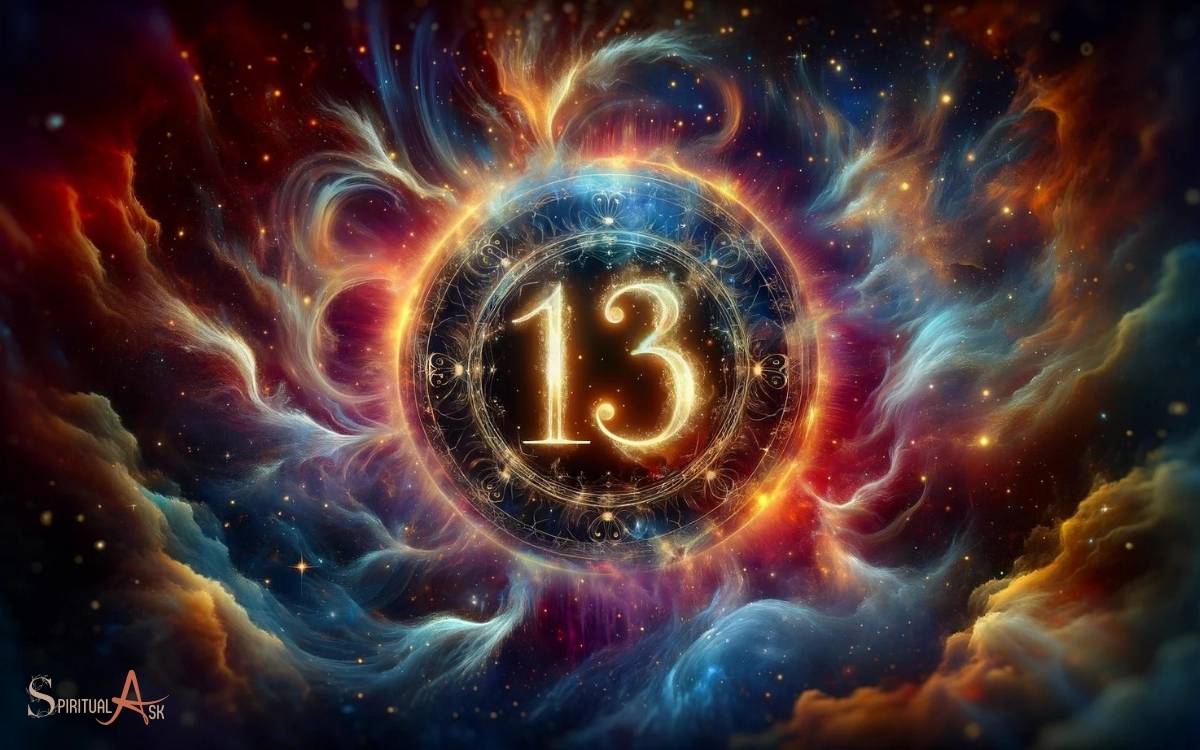What Does the Number 13 Symbolize Spiritually? Change!
The number 13 often symbolizes transformation, change, and rebirth in a spiritual context. In many cultures, it’s considered a powerful number that can signify the passing of old ways and the emergence of new beginnings
Spiritually, the number 13 can carry diverse meanings influenced by cultural, historical, and religious contexts:
For example, in a tarot deck, the card numbered 13 is the Death card, which is commonly interpreted not as a literal death but as symbolic of the end of something and the beginning of something new a transformation of sorts.
In spiritual circles, the number 13 is often embraced as a sign of unexpected blessings and transformative growth, challenging the superstitions that surround it.

Key Takeaway
The Symbolism of Number 13 in Christianity
The number 13 holds significance in Christianity as it represents the Last Supper, where Jesus and his 12 disciples gathered for a sacred meal. This event marks the moment when Jesus foretold his betrayal by one of the 12 present.
The betrayer, Judas Iscariot, was the 13th to sit at the table. This association with betrayal and upheaval has led to the number 13 being viewed as unlucky in some Christian traditions.
However, it’s important to note that the Last Supper also symbolizes communion and sacrifice, making the number 13 a complex symbol in Christianity.
Number 13 in Tarot and Divination
In Christianity, the symbolism of the number 13 is often associated with the Last Supper, but in tarot and divination, it takes on a different significance.
When exploring the number 13 in tarot and divination, it’s important to consider:
- The Death Card: In tarot, the 13th card is often the Death card, which signifies transformation and new beginnings rather than literal death.
- Karmic Lessons: The number 13 in divination can represent karmic lessons or the need to let go of past experiences to embrace growth.
- Feminine Energy: In some tarot decks, the 13th card is associated with feminine energy, intuition, and the unseen aspects of life.
- Unpredictability: The presence of the number 13 in divination may also symbolize unpredictability or the need to adapt to change.
Understanding the symbolism of the number 13 in tarot and divination can provide insight into personal growth and spiritual development.
The Thirteen Moon Calendar in Indigenous Cultures
Growing up in an indigenous community, my understanding of the sacred Thirteen Moon Calendar was deeply rooted in the natural rhythms of our spiritual traditions.
This calendar, followed by many indigenous cultures, harmonizes with the cycles of the moon and the natural world.
Here’s a glimpse into how the Thirteen Moon Calendar aligns with the Gregorian calendar:
| Gregorian Month | Thirteen Moon Calendar | Corresponding Moon Phase |
|---|---|---|
| January | Magnetic Moon | New Moon |
| February | Lunar Moon | First Quarter |
| March | Electric Moon | Full Moon |
| April | Self-Existing Moon | Last Quarter |
| May | Overtone Moon | New Moon |
This unique calendar attunes us to the interconnectedness of all life and invites us to live in harmony with the natural world.
13 as a Symbol of Transformation and Renewal
As a member of an indigenous community, my understanding of the number 13 is deeply rooted in the concept of transformation and renewal.
In our traditions, the number 13 symbolizes profound change and the continuous cycle of rebirth.
This spiritual significance evokes a sense of awe and reverence, as it represents the following emotional aspects:
- Hope: The number 13 embodies the belief in the possibility of positive transformation, bringing hope for a better future.
- Release: It signifies the release of old patterns and the opportunity for personal growth and renewal.
- Resilience: It instills a sense of resilience, reminding us that even in the face of adversity, transformation is possible.
- Connectedness: It represents the interconnectedness of all living things, emphasizing the cyclical nature of life and the potential for ongoing renewal.
Understanding the spiritual symbolism of the number 13 fosters a deep appreciation for the transformative power of renewal in our lives. Often associated with cycles of endings and new beginnings, the number 13 encourages us to embrace change as a vital part of personal growth and evolution. Interestingly, when exploring the number 6 spiritual meaning, we find a complementary energy, symbolizing harmony, balance, and nurturing love, which can help ground us during times of transformation. Together, these numbers remind us of the interconnectedness between life’s transitions and the stability needed to navigate them gracefully.
The Unlucky Connotation of 13 in Western Culture
I’ve always found it fascinating how the number 13 carries such a negative superstition in Western culture. It’s intriguing to explore the cultural impact of this superstition and how it has influenced various aspects of society.
From skipping the 13th floor in buildings to the fear of Friday the 13th, the unlucky connotation of 13 has pervaded many facets of Western life.
Negative Superstitions Around 13
The negative connotations associated with the number 13 in Western culture are deeply ingrained and pervasive.
It’s important to understand the impact of these superstitions:
- Fear: Many people experience genuine fear or anxiety when the 13th day of the month falls on a Friday.
- Avoidance: Buildings often skip having a 13th floor, and some hotels and hospitals omit room number 13.
- Stigmatization: People born on the 13th may feel stigmatized, leading to a lack of celebration on their birthdays.
- Cultural Influence: Negative superstitions about 13 have been perpetuated by popular culture, further embedding the fear in society.
These superstitions have real effects on individuals and societies, and it’s essential to recognize and understand their impact.
Cultural Impact of 13
The negative superstitions surrounding the number 13 have deeply influenced Western culture, perpetuating its unlucky connotation.
In Western societies, the fear of the number 13 is known as triskaidekaphobia. This superstition has led to the avoidance of the number 13 in various aspects of life.
For example, many buildings skip the 13th floor, and some airlines and hotels avoid having a row 13.
Additionally, Friday the 13th is considered an especially unlucky day, leading to heightened anxiety and caution for some individuals.
These cultural beliefs have seeped into popular media, with numerous movies and books portraying the number 13 as an omen of misfortune.
Despite efforts to debunk these superstitions, the negative cultural impact of 13 continues to persist in Western societies, influencing people’s behaviors and decisions.
The Sacredness of 13 in Ancient Traditions
In exploring the significance of the number 13 in ancient traditions, it becomes evident that its sacredness is deeply rooted in various cultures and belief systems.
The ancient traditions surrounding the number 13 evoke a sense of awe and wonder, as they reveal the profound spiritual connections it held for different civilizations.
The sacredness of 13 in ancient traditions is a testament to the enduring power of this number in shaping spiritual beliefs and practices across diverse cultures. It is a symbol of cosmic harmony, representing the balance and cycles of nature.
The reverence for 13 in ancient traditions reflects the universal human quest for meaning and connection to the divine. This sacred number embodies the mysteries of the universe and the timeless wisdom passed down through generations.
Conclusion
The number 13 holds diverse spiritual significance across different cultures and traditions. From representing transformation and renewal to being considered unlucky in Western culture, the number 13 has a rich and varied symbolic meaning.
Despite its negative connotations in some societies, the spiritual significance of 13 in ancient traditions and indigenous cultures reminds us of the depth and complexity of spiritual symbolism. Just like the number 13, spiritual symbolism is multifaceted and open to interpretation.






